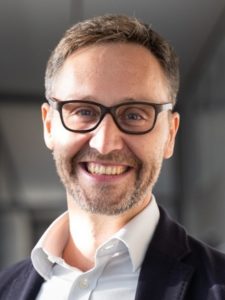Online loss minimization for electrical machines
Wednesday 21 April 2021 at 2:00 PM CET (8:00 AM EST)
by Christoph Michael Hackl (Munich University of Applied Sciences (MUAS), Germany)

Register now using the link below:
https://attendee.gotowebinar.com/register/1215027832393104140
Abstract:
Electrical machines consume more than 50% of the globally generated electricity. Hence, advances in research on the loss minimization of electrical drives (machine+inverter) have been made; in particular for synchronous machines (SMs) with non-negligible saliency and machine nonlinearities. The online computation of the optimal reference currents for the different operation strategies such as Maximum Torque per Current (MTPC), Field Weakening (FW), Maximum Current (MC) and Maximum Torque per Voltage (MTPV) or Maximum Torque per Flux (MTPF), is usually done numerically or analytically imposing simplifying assumptions (e.g. neglecting stator resistance and/or cross-coupling inductance and/or iron losses) on the machine model or the physical constraints (e.g. voltage ellipse).
Numerical solutions, in general, increase the computational load on the real-time system. Analytical solutions are more attractive, since they are easier to implement, more accurate, faster to compute and make large look-up tables (LUTs) with more than two or three dimensions obsolete. However, to the best knowledge of the author, a unified theory providing analytical solutions while explicitly considering copper _and_ iron losses and arbitrary machine nonlinearities for all operation modes is not yet available. In this webinar, a unified theory for generic loss minimization by optimal feedforward torque control (OFTC) of electrical machines is presented which allows to analytically compute (i) the optimal direct and quadrature reference currents for all operating strategies, such as MTPC, MC, FW, MTPV or MTPF, and, in particular, Maximum Torque per Losses (MTPL, which considers copper & iron losses) (ii) the transition points indicating when to switch between the operating strategies due to speed, voltage and/or current constraints. The analytical solutions allow for an (almost) instantaneous selection of the actual operation strategy and the computation of its corresponding optimal reference currents.
Numerical methods (approximating these solutions only) are no longer required. The unified theory is based on one simple idea: All optimization problems, their respective constraints and the computation of the intersection point(s) of voltage ellipse, current circle, or torque, MTPL, MTPC, MTPV, MTPF hyperbolas are reformulated implicitly as quadrics (quadratic surfaces). This allows to invoke the Lagrangian formalism and to find the roots of fourth-order polynomials analytically. The proposed theory is suitable for any electrical machine (e.g. synchronous machines with constant excitation but also induction machines). Simulation and measurement results illustrate effectiveness and applicability of the proposed solution.
Presenter’s bio:
Christoph Michael Hackl is a Professor for “Electrical Machines and Drives” at the Munich University of Applied Scienes (MUAS), Germany. He received his interdisciplinary PhD degree in Electrical Engineering and Information Technology and Mathematics from the Technical University of Munich (TUM; Prof. D. Schröder) and the Technical University of Ilmenau (TUI; Prof. A. Ilchmann) in 2012.
After a brief post-doc phase at the chair for Electrical Drive Systems and Power Electronics (TUM; Prof. R. Kennel), in 2014, he became head of the research group “Control of Renewable Energy Systems (CRES)” at the Munich School of Engineering (MSE) at TUM. In 2018, he became a Professor and the head of the “Laboratory for Mechatronic and Renewable Energy Systems (LMRES)” at MUAS.
Since 2019, Dr. Hackl is co-founder and co-head of the research “Institute for Sustainable Energy Systems (ISES)” at MUAS. His research interests are modeling, control, design and optimization of the electrical components of renewable and mechatronic energy systems (e.g. airborne wind energy systems, small- and large-scale wind turbine systems, geothermal power plants, wave energy converters, electric vehicles and power systems).
Dr. Hackl is IEEE Senior Member and works as a reviewer for interdisciplinary journals (e.g. System & Control Letters, IEEE Transactions on Industrial Electronics (TIE), Power Electronics (TPEL) or Automatic Control (TAC)).
He has published more than 140 scientific contributions in books, journals and conference proceedings (see https://lmres.ee.hm.edu/index.php?id=hackl).

